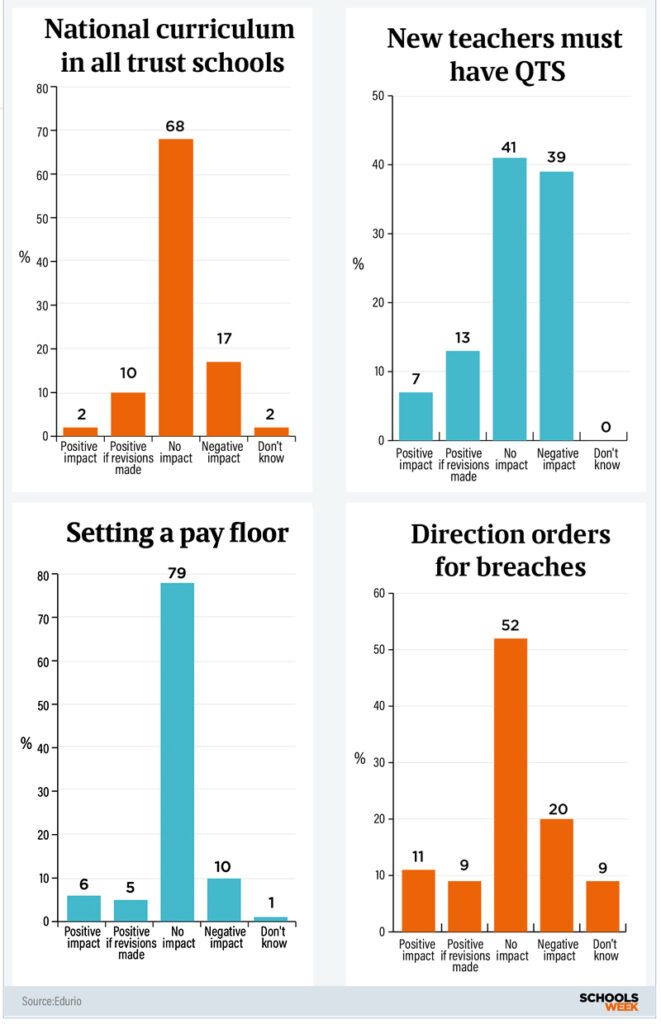Most trust CEOs say reforms that strip away academy freedoms on pay and curriculum would have no impact on their ability to run and improve schools.
Some say the findings, from a survey of 120 trust bosses running around 1,000 schools, challenge the narrative that Labour’s reforms are opposed by all academies.
However, the survey did find trust leaders were particularly worried about changes that all new teachers must be qualified, and few said the changes would actually have a positive impact.
‘Critics don’t speak for everyone’
But Baroness Longfield, the former children’s commissioner who chairs the Centre for Young Lives think-tank, said the findings “put to bed the idea that the entire MAT sector is opposed to the proposals in this important bill.
“It is a good reminder that the most strident critics are often not speaking for everyone.”
The poll, conducted by Edurio for Schools Week, asked leaders for their views on whether the schools bill changes will impact their work.
Questions related to proposals to take away academy freedoms on curriculum, pay and employing unqualified teachers. A fourth question was on Labour’s plans to introduce new trust compliance orders.
For each of the policies, the most likely response was that it would have “no affect” on trust leaders’ work.
When asked about forcing academies to follow a national pay “floor, but no ceiling”, 79 per cent said it would have no impact.
Meanwhile, almost 70 per cent of chief executives think the implementation of the national curriculum in all academies will have no impact on their work.
More than half gave the same response to new laws handing the secretary of statewide-ranging powers to issue academy compliance orders.
Under the changes, education secretary Bridget Phillipson would be able to give trusts whatever “directions” she “considers appropriate”.

Responding trusts represented a range of sizes. Just over half had fewer than 10 schools, a third had between 10 and 19 and 13 per cent had 20-plus schools.
“A lot of loud voices have been campaigning, but the fact of the matter is what the CEOs have said here – these things will not have a big impact,” said former Association of School and College Leaders general secretary Brian Lightman.
But former national schools commissioner Sir David Carter said: “Shouldn’t a government policy help leaders to improve their schools, not create a sense of relief that the policy won’t get in their way?”
But few say changes positive …
And for each of the four policies – leaders were actually more likely to say the changes would have a negative than wholly positive impact.
For curriculum changes, just two per cent of surveyed leader said changes would be positive, compared to 17 per cent saying they would have a negative impact. However, another 10 per cent said they would be positive with “revisions made”.
Of those who expressed concern over the policy, some worried it would limit their “flexibility to adapt the curriculum to local contexts and student needs, stifling innovation”, according to Edurio.
Confederation of School Trusts CEO Leora Cruddas said the government has “not provided any evidence that the current freedoms cause any harm”.
But she said that removing freedoms “risks doing so for many schools and the children they serve”.
… and concern over QTS reforms
Trust leaders were most concerned about proposals for all new teachers to be qualified. While just over two-fifths did not expect to be affected by requirements, 39 per cent said they would be negatively impacted.
One CEO told the pollsters they would “have difficulty filling all vacancies without unqualified teachers” as finding those “who want to work in the SEND world… is very challenging”.
Another stressed that their trust appoints “graduates as unqualified teachers” when they cannot recruit anyone with qualified teacher status. The graduates usually gain qualifications over the following two years.
If the legislation is implemented, this would “cut off an important alternative when recruitment has proven impossible. The current recruitment (and retention) crisis has left us with little other choice.”
And Jonathan Simons, partner at Public First consultants, said the findings point to the schools bill actually having a “much greater impact on the academy sector [than] one might expect.
“It shows academy freedoms are more widely used than commonly thought.”
‘Policymakers need to listen to leaders’
Ernest Jenavs, CEO of Edurio, which runs school surveys, added the findings “allow us to build a deeper understanding of how the planned policy changes might influence the sector responsible for educating the majority of pupils across England.
“More importantly, trust leaders have shared a wide range of considerations that policymakers should consider in the implementation of the legislation to ensure improved outcomes and fewer unintended consequences.”
Education Secretary Bridget Phillipson said: “I know that academy CEOs, and school leaders across the board, want the same thing government does: for every child, wherever they grow up and go to school, to receive a brilliant education.”
Correction: We have removed an incorrect calculation that 60 per cent of CEOs overall said the changes would have no impact. The findings provided were solely for individual policies, and the story now fully reflects that.
















Your thoughts